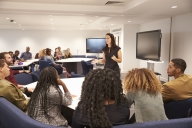You have /5 articles left.
Sign up for a free account or log in.

iStock
I received my B.S. and Ph.D. in chemical engineering and spent 10 years of schooling getting my scientific questions answered and asking new questions without any problems. Graduate school was hard at times, but I told myself that if one week went by that I didn’t learn something new and exciting, I would quit. That week never came.
When I was 12 years old, I remember scanning the shelves of the middle school library for the last book about Harriet Tubman. I was obsessed. Here was a woman who escaped slavery only to turn around and help others escape as well. She was hungry and cold, and yet she continued. Oh, to be that brave! Soon her face will stare back from the $20 bill and inspire a new generation.
I often think about how she took her friends’ hands and helped them follow her path, and I think of her sometimes when students come into my office and ask how they will make it to graduation. As an instructor in engineering at Penn State University, my path has not been anywhere near as hard as hers. But I am thankful for her example, which has guided me in many ways over the years.
As a 12-year-old, I also asked a lot of scientific questions and was frustrated when I didn’t get answers. If I had a sore throat and went to see the doctor, I would be frustrated when they couldn’t tell me exactly why it hurt so much. It was hard for me to make sense of the world, but when I took chemistry in high school, it all began to click. In chemistry class, I started to learn what causes sore throats, how products are formed and what causes acid rain. Once I could understand these things at the molecular level, they made sense to me.
And then one day, the teacher brought up vapor pressure. In my head, I couldn’t reconcile vapor pressure and atmospheric pressure. But I really wanted to understand, so when he was about to continue onto another topic, I raised my hand.
“Before you go on, can I ask another question about vapor pressure?” I asked.
His response surprised the whole class: “I can’t stand this rude behavior. I am not teaching anymore -- go work on your labs.”
I was stunned. My friends were stunned. What just happened? After school, I went to see him and he apologized, saying that he was not used to women speaking out like that. He was an old man, he said, and he was sorry. Up until then I never thought that my questions would challenge something, and they didn’t again for many years.
But underlying those 10 years, I was still thinking a little bit about Harriet Tubman. As an undergraduate student, I took a few women’s studies classes and learned about feminists like Alice Paul, who asked, boldly, when women would get the right to vote. During these years, I also wondered how I could use what I had learned in engineering to give back -- to make the world a better place. You see, I had noticed that only two of my engineering professors, in 10 years of schooling, were women. How could I, as an engineer and as a woman with a Ph.D., make a difference and then help others to follow my path?
The birth of our first daughter and, two years later, our second daughter compounded the question. Now I wanted to make a difference in the world, and I wanted to make a difference in their lives. I wanted to take their little hands and show them the way. Ultimately, I decided to take a break from my scientific and engineering questioning, and my charge to make a difference in the world, and spent five years as a stay-at-home mom.
I was not alone in my decision. Studies of more than 5,000 female engineering students have revealed that 38 percent of the women graduating with an engineering degree are no longer working in the field of engineering. One-third of the women who left the field did so to care for children. Others left due to a hostile work environment and a lack of advancement opportunities. For instance, as of fall 2011, while women made up 31 percent of all chemical engineering doctoral students, they comprised only 16 percent of tenured or tenure-track faculty members.
Reflecting on my choice, I have come to the conclusion that one main reason for it was that the working environment expectations were not compatible with a sustainable work-life balance for me. For example, both the female and male faculty role models I knew worked around 56 hours a week. I didn’t see how I could work those hours and still cook meals, sleep, form strong friendships and spend time with my family.
More important, at that time, I did not have a research question that was socially relevant and that drove me. The National Academy of Engineers has found that using phrases such as “making a difference” create a much more appealing image, especially to women and minorities, than “being good at math and science.” Studies have shown that women and minorities desire to serve in fields that are socially meaningful.
I know that was the case for me. I wanted to directly influence peoples’ lives. Ultimately, I decided that I could do that more effectively by spending time with my children. And, in that time, I developed a wonderful community of supportive women whom I still rely on today.
But after five years of being home, my curiosity (about topics like vapor pressure) and desire to make a difference in the world outside my home (like Harriet Tubman) called me back into the work world. I accepted a position as an instructor in environmental engineering at Penn State University and began to teach students how to treat water and wastewater and how to clean up polluted streams. I was asking new questions about science and engineering. It was fun to learn again. But then I wondered if I could do more.
One question wouldn’t leave my mind: How do we get clean water to those who need it most? So I used my knowledge from graduate school to create a sustainable process for clean water in the developing world, using the seed of a tree found in equatorial regions. I worked with dozens of undergraduate students in borrowed labs and with little money, but I was doing what I loved. To this day, we continue to design and develop our water filters, publishing our results and working with others on the social implications of our discoveries.
The path is not easy, and it is not straight. I am a part-time instructor, a fixed-term faculty member with no clear pathway for promotion and no job security. I have met other people like me, and together we have started to ask bold questions of the administration, notably: What can be done to value and honor the men and women who serve this university in different ways? So we are working to create clear job titles and promotion pathways for fixed-term faculty members.
I don’t have the answers yet; that story is still unfolding. In the meantime, I meet with students who come to my door to ask how they can use their engineering skills to change the world. I am reaching back and taking their hands and showing them a way to reconcile their own Harriet Tubman and vapor pressure conflicts. And I am teaching them to ask their own bold questions about what is possible.








